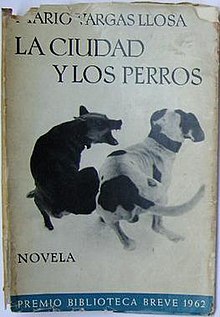
(publ. Seix Barral)
The Time of the Hero (Original title: La ciudad y los perros, literally "The City and the Dogs") is a 1963 novel by Peruvian writer and Nobel laureate Mario Vargas Llosa. It was Vargas Llosa's first novel and is set among the cadets at the Leoncio Prado Military Academy in Lima, which he attended as a teenager. The novel portrays the school so scathingly that its leadership burned many copies and condemned the book as Ecuadorian propaganda against Peru.
It won the 1962 Premio Biblioteca Breve for best unpublished novel and the 1963 Premio de la Crítica Española.
Style and themes
The novel is notable for its experimental and complex employment of multiple perspectives in a non-linear fashion. A technique influenced by William Faulkner and particularly the novel Light in August.
It is a story about adolescence and young males transition to manhood, but is also described to portray a microcosm of the Peruvian society. It features themes such as masculinity, hierarchy, secrecy and the military.
Plot summary
The story concerns the theft of an examination paper by the cadet Cava carried out under orders from Jaguar, the brutal leader of a group of cadets called The Circle. The theft is reported by a lowly cadet called The Slave whom Jaguar consequently murders during military maneuvers. Concerned for the school’s reputation, the administrators choose to ignore further evidence of Jaguar’s guilt.
Background
The novel is based on Vargas Llosa's own experiences of Leoncio Prado Military Academy, which he attended as a teenager in the early 1950s. He worked on the manuscript for the novel while he was living in France and it was published as his first novel in 1962.
Film adaptation
The novel was adapted into a 1985 film by Peruvian director Francisco Lombardi.
References
- "Introduction & Overview of The Time of the Hero". BookRags. Retrieved 2016-04-30.
- "Cinco novelas esenciales de Mario Vargas Llosa" [Five Essential Novels by Mario Vargas Llosa]. Semana (in Spanish). 10 July 2010. Retrieved 5 September 2018.
- ^ A Study Guide for Mario Vargas Llosa's "The Time of the Hero", Gale 2016
- "The masters who influenced the Latin American Boom: Vargas Llosa and García Márquez took cues from Faulkner". El Pais. 21 November 2012.
External links
- Magnarelli, Sharon (May 1981), "La ciudad y los perros: Women and Language", Hispania, 64 (2), American Association of Teachers of Spanish and Portuguese: 215–225, doi:10.2307/341856, JSTOR 341856.
- La ciudad y los perros, information on the film from the IMDb
This article about a 1960s novel is a stub. You can help Misplaced Pages by expanding it. See guidelines for writing about novels. Further suggestions might be found on the article's talk page. |